- Home
- P. G. Wodehouse
Jill the Reckless Page 11
Jill the Reckless Read online
Page 11
CHAPTER XI
MR. PILKINGTON'S LOVE LIGHT
I
The rehearsals of a musical comedy--a term which embraces "musicalfantasies"--generally begin in a desultory sort of way at that curiousbuilding, Bryant Hall, on Sixth Avenue just off Forty-second Street.There, in a dusty, uncarpeted room, simply furnished with a few woodenchairs and some long wooden benches, the chorus--or, in the case of"The Rose of America," the ensemble--sit round a piano and endeavour,with the assistance of the musical director, to get the words andmelodies of the first-act numbers into their heads. This done, theyare ready for the dance director to instil into them the steps, thegroupings, and the business for the encores, of which that incurableoptimist always seems to expect there will be at least six. Later, theprincipals are injected into the numbers. And finally, leaving BryantHall and dodging about from one unoccupied theatre to another,principals and chorus rehearse together, running through the entirepiece over and over again till the opening night of the preliminaryroad tour.
To Jill, in the early stages, rehearsing was just like being back atschool. She could remember her first schoolmistress, whom the musicaldirector somewhat resembled in manner and appearance, hammering outhymns on a piano and leading in a weak soprano an eager, baying packof children, each anxious from motives of pride to out-bawl hernearest neighbour.
The proceedings began on the first morning with the entrance of Mr.Saltzburg, the musical director, a brisk, busy little man withbenevolent eyes behind big spectacles, who bustled over to the piano,sat down, and played a loud chord, designed to act as a sort of bugleblast, rallying the ladies of the ensemble from the corners where theysat in groups, chatting. For the process of making one another'sacquaintance had begun some ten minutes before with mutualrecognitions between those who knew each other from having beentogether in previous productions. There followed rapid introductionsof friends. Nelly Bryant had been welcomed warmly by a pretty girlwith red hair, whom she introduced to Jill as Babe; Babe had a willowyblonde friend, named Lois, and the four of them had seated themselveson one of the benches and opened a conversation their numbers beingadded to a moment later by a dark girl with a Southern accent andanother blonde. Elsewhere other groups had formed, and the room wasfilled with a noise like the chattering of starlings. In a body bythemselves, rather forlorn and neglected, half a dozen solemn andimmaculately dressed young men were propping themselves up againstthe wall and looking on, like men in a ball-room who do not dance.
Jill listened to the conversation without taking any great part in itherself. She felt as she had done on her first day at school, a littleshy and desirous of effacing herself. The talk dealt with clothes,men, and the show business, in that order of importance. Presently oneof the young men sauntered diffidently across the room and addedhimself to the group with the remark that it was a fine day. He wasreceived a little grudgingly, Jill thought, but by degrees succeededin assimilating himself. A second young man drifted up; reminded thewillowy girl that they had worked together in the western company of"You're the One"; was recognized and introduced, and justified hisadmission to the circle by a creditable imitation of a cat-fight. Fiveminutes later he was addressing the Southern girl as "honey," and hadinformed Jill that he had only joined this show to fill in beforeopening on the three-a-day with the swellest little song-and-dance actwhich he and a little girl who worked in the cabaret at Geisenheimer'shad fixed up.
On this scene of harmony and good-fellowship Mr. Saltzburg's chordintruded jarringly. There was a general movement, and chairs andbenches were dragged to the piano. Mr. Saltzburg causing a momentarydelay by opening a large brown music-bag and digging in it like aterrier at a rat-hole, conversation broke out again.
Mr. Saltzburg emerged from the bag, with his hands full of papers,protesting.
"Childrun! Chil-_drun_! If you please, less noise and attend to me!"He distributed sheets of paper. "Act One, Opening Chorus. I will playthe melody three--four times. Follow attentively. Then we will sing itla-la-la, and after that we will sing the words. So!"
He struck the yellow-keyed piano a vicious blow, producing a tinny andcomplaining sound. Bending forward with his spectacles almost touchingthe music, he plodded determinedly through the tune, then encoredhimself, and after that encored himself again. When he had done this,he removed his spectacles and wiped them. There was a pause.
"Izzy," observed the willowy young lady chattily, leaning across Jilland addressing the Southern girl's blonde friend, "has promised me asunburst!"
A general stir of interest and a coming close together of heads.
"What! Izzy!"
"Sure, Izzy."
"Well!"
"He's just landed the hat-check privilege at the St. Aurea!"
"You don't say!"
"He told me so last night and promised me the sunburst. He was,"admitted the willowy girl regretfully, "a good bit tanked at the time,but I guess he'll make good." She mused awhile, a rather anxiousexpression clouding her perfect profile. She looked like a meditativeGreek goddess. "If he doesn't," she added with maidenly dignity, "it'sthe last time _I_ go out with the big stiff. I'd tie a can to himquicker'n look at him!"
A murmur of approval greeted this admirable sentiment.
"Childrun!" protested Mr. Saltzburg. "Chil-drun! Less noise andchatter of conversation. We are here to work! We must not waste time!So! Act One, Opening Chorus. Now, all together. La-la-la...."
"La-la-la...."
"Tum-tum-tumty-tumty...."
"Tum-tum-tumty...."
Mr. Saltzburg pressed his hands to his ears in a spasm of pain.
"No, no, no! Sour! Sour! Sour!... Once again. La-la-la...."
A round-faced girl with golden hair and the face of a wondering cherubinterrupted, speaking with a lisp.
"Mithter Thalzburg."
"Now what is it, Miss Trevor?"
"What sort of a show is this?"
"A musical show," said Mr. Saltzburg severely, "and this is arehearsal of it, not a conversazione. Once more, please."
The cherub was not to be rebuffed.
"Is the music good, Mithter Thalzburg?"
"When you have rehearsed it, you shall judge for yourself. Comenow...."
"Is there anything in it as good as that waltz of yours you played uswhen we were rehearthing 'Mind How You Go?' You remember. The one thatwent...."
A tall and stately girl, with sleepy brown eyes and the air of aduchess in the servants' hall, bent forward and took a kindly interestin the conversation.
"Oh, have you composed a varlse, Mr. Saltzburg?" she asked withpleasant condescension. "How interesting, really! Won't you play itfor us?"
The sentiment of the meeting seemed to be unanimous in favour ofshelving work and listening to Mr. Saltzburg's waltz.
"Oh, Mr. Saltzburg, do!"
"Please!"
"Some one told me it was a pipterino!"
"I cert'nly do love waltzes!"
"Please, Mr. Saltzburg!"
Mr. Saltzburg obviously weakened. His fingers touched the keysirresolutely.
"But, childrun!"
"I am sure it would be a great pleasure to all of us," said theduchess graciously, "if you would play it. There is nothing I enjoymore than a good varlse."
Mr. Saltzburg capitulated. Like all musical directors he had in hisleisure moments composed the complete score of a musical play andspent much of his time waylaying librettists on the Rialto and tryingto lure them to his apartment to listen to it, with a view tobusiness. The eternal tragedy of a musical director's life iscomparable only to that of the waiter who, himself fasting, has toassist others to eat. Mr. Saltzburg had lofty ideas on music, and hissoul revolted at being compelled perpetually to rehearse and directthe inferior compositions of other men. Far less persuasion than hehad received to-day was usually required to induce him to play thewhole of his score.
"You wish it?" he said. "Well, then! This waltz, you will understand,is the theme of a musical romance which I have composed. It
will besung once in the first act by the heroine, then in the second act as aduet for heroine and hero. I weave it into the finale of the secondact, and we have an echo of it, sung off stage, in the third act. WhatI play you now is the second act duet. The verse is longer. So! Themale voice begins."
A pleasant time was had by all for ten minutes.
"Ah, but this is not rehearsing, childrun!" cried Mr. Saltzburgremorsefully at the end of that period. "This is not business. Comenow, the opening chorus of Act One, and please this time keep on thekey. Before, it was sour, sour Come! La-la-la...."
"Mr. Thalzburg!"
"Miss Trevor?"
"There was an awfully thweet fox-trot you used to play us. I dowish...."
"Some other time, some other time! Now we must work. Come!La-la-la...."
"I wish you could have heard it, girls" said the cherub regretfully."Honetht, it was lalapalootha!"
The pack broke into full cry.
"Oh, Mr. Saltzburg!"
"Please, Mr. Saltzburg!"
"Do play the fox-trot, Mr. Saltzburg!"
"If it is as good as the varlse," said the duchess, stooping once moreto the common level, "I am sure it must be very good indeed." Shepowdered her nose. "And one so rarely hears musicianly music nowadays,does one?"
"Which fox-trot?" asked Mr. Saltzburg weakly.
"Play 'em all!" decided a voice on the left.
"Yes, play 'em all," bayed the pack.
"I am sure that that would be charming," agreed the duchess, replacingher powder-puff.
Mr. Saltzburg played 'em all. This man by now seemed entirely lost toshame. The precious minutes that belonged to his employers and shouldhave been earmarked for "The Rose of America" flitted by. The ladiesand gentlemen of the ensemble, who should have been absorbing andlearning to deliver the melodies of Roland Trevis and the lyrics ofOtis Pilkington, lolled back in their seats. The yellow-keyed pianorocked beneath an unprecedented onslaught. The proceedings had begunto resemble not so much a rehearsal as a happy home evening, andgrateful glances were cast at the complacent cherub. She had, it wasfelt, shown tact and discretion.
Pleasant conversation began again.
"... And I walked a couple of blocks, and there was exactly the samemodel in Schwartz and Gulderstein's window at twenty-six fifty...."
"... He got on Forty-second Street, and he was kinda fresh from thestart. At Sixty-sixth he came sasshaying right down the car and said'Hello, patootie!' Well, I drew myself up...."
"... Even if you are my sister's husband,' I said to him. Oh, Isuppose I got a temper. It takes a lot to arouse it, y'know, but I c'nget pretty mad...."
"... You don't know the half of it, dearie, you don't know the half ofit! A one-piece bathing suit! Well, you could call it that, but thecop of the beach said it was more like a baby's sock. And when...."
"... So I said 'Listen, Izzy, that'll be about all from you! My fatherwas a gentleman, though I don't suppose you know what that means, andI'm not accustomed....'"
"Hey!"
A voice from the neighbourhood of the door had cut into the babblelike a knife into butter; a rough, rasping voice, loud and compelling,which caused the conversation of the members of the ensemble to ceaseon the instant. Only Mr. Saltzburg, now in a perfect frenzy ofmusicianly fervour, continued to assault the decrepit piano, unwittingof an unsympathetic addition to his audience.
"What I play you now is the laughing trio from my second act. It is abuilding number. It is sung by tenor, principal comedian, andsoubrette. On the second refrain four girls will come out and twoboys. The girls will dance with the two men, the boys with thesoubrette. So! On the encore four more girls and two more boys. Thirdencore, solo-dance for specialty dancer, all on stage beating time byclapping their hands. On repeat, all sing refrain once more, and off.Last encore, the three principals and specialty dancer dance the dancewith entire chorus. It is a great building number, you understand. Itis enough to make the success of any musical play, but can I get ahearing? No! If I ask managers to listen to my music, they are busy!If I beg them to give me a libretto to set, they laugh--ha! ha!" Mr.Saltzburg gave a spirited and lifelike representation of a managerlaughing ha-ha when begged to disgorge a libretto. "Now I play it oncemore!"
"Like hell you do!" said the voice. "Say, what is this, anyway? Aconcert?"
Mr. Saltzburg swung round on the music-stool, a startled andapprehensive man, and nearly fell off it. The divine afflatus left himlike air oozing from a punctured toy-balloon, and, like such aballoon, he seemed to grow suddenly limp and flat. He stared withfallen jaw at the new arrival.
Two men had entered the room. One was the long Mr. Pilkington. Theother, who looked shorter and stouter than he really was beside hisgiraffe-like companion, was a thick-set, fleshy man in the earlythirties with a blond, clean-shaven, double-chinned face. He hadsmooth, yellow hair, an unwholesome complexion, and light green eyes,set close together. From the edge of the semi-circle about the piano,he glared menacingly over the heads of the chorus at the unfortunateMr. Saltzburg.
"Why aren't these girls working?"
Mr. Saltzburg, who had risen nervously from his stool, backed awayapprehensively from his gaze, and, stumbling over the stool, sat downabruptly on the piano, producing a curious noise like Futurist music.
"I--We--Why, Mr. Goble...."
Mr. Goble turned his green gaze on the concert audience, and spreaddiscomfort as if it were something liquid which he was sprayingthrough a hose. The girls who were nearest looked down flutteringly attheir shoes: those further away concealed themselves behind theirneighbours. Even the duchess, who prided herself on being thepossessor of a stare of unrivalled haughtiness, before which the freshquailed and those who made breaks subsided in confusion, was unable tomeet his eyes: and the willowy friend of Izzy, for all her victoriesover that monarch of the hat-checks, bowed before it like a slim treebefore a blizzard.
Only Jill returned the manager's gaze. She was seated on the outer rimof the semi-circle, and she stared frankly at Mr. Goble. She had neverseen anything like him before, and he fascinated her. This behaviouron her part singled her out from the throng, and Mr. Gobleconcentrated his attention on her.
For some seconds he stood looking at her; then, raising a stubbyfinger, he let his eye travel over the company, and seemed to beengrossed in some sort of mathematical calculation.
"Thirteen," he said at length. "I make it thirteen." He rounded on Mr.Pilkington. "I told you we were going to have a chorus of twelve."
Mr. Pilkington blushed and stumbled over his feet.
"Ah, yes ... yes," he murmured vaguely. "Yes!"
"Well, there are thirteen here. Count 'em for yourself." He whippedround on Jill. "What's _your_ name? Who engaged you?"
A croaking sound from the neighbourhood of the ceiling indicated theclearing of Mr. Pilkington's throat.
"I--er--_I_ engaged Miss Mariner, Mr. Goble."
"Oh, _you_ engaged her?"
He stared again at Jill. The inspection was long and lingering, andaffected Jill with a sense of being inadequately clothed. She returnedthe gaze as defiantly as she could, but her heart was beating fast.She had never yet been frightened of any man, but there was somethingreptilian about this fat, yellow-haired individual which disquietedher, much as cockroaches had done in her childhood. A momentarythought flashed through her mind that it would be horrible to betouched by him. He looked soft and glutinous.
"All right," said Mr. Goble at last, after what seemed to Jill manyminutes. He nodded to Mr. Saltzburg. "Get on with it! And try workinga little this time! I don't hire you to give musical entertainments."
"Yes, Mr. Goble, yes. I mean no, Mr. Goble!"
"You can have the Gotham stage this afternoon," said Mr. Goble. "Callthe rehearsal for two sharp."
Outside the door, he turned to Mr. Pilkington.
"That was a fool trick of yours, hiring that girl. Thirteen! I'd assoon walk under a ladder on a Friday as open in New York with a chorusof thirteen. Well, it
don't matter. We can sack one of 'em after we'veopened on the road." He mused for a moment. "Darned pretty girl,that!" he went on meditatively. "Where did you get her?"
"She--ah--came into the office, when you were out. She struck me asbeing essentially the type we required for our ensemble, soI--er--engaged her. She--" Mr. Pilkington gulped. "She is a charming,refined girl!"
"She's darned pretty," admitted Mr. Goble, and went on his way wrappedin thought, Mr. Pilkington following timorously. It was episodes likethe one that had just concluded which made Otis Pilkington wish thathe possessed a little more assertion. He regretted wistfully that hewas not one of those men who can put their hat on the side of theirheads and shoot out their chins and say to the world "Well, what aboutit!" He was bearing the financial burden of this production. If itshould be a failure, his would be the loss. Yet somehow this coarse,rough person in front of him never seemed to allow him a word in theexecutive policy of the piece. He treated him as a child. Hedomineered and he shouted, and behaved as if he were in sole command.Mr Pilkington sighed. He rather wished he had never gone into thisundertaking.
Inside the room, Mr. Saltzburg wiped his forehead, his spectacles, andhis hands. He had the aspect of one who wakes from a dreadful dream.
"Childrun!" he whispered brokenly. "Childrun! If you please, oncemore. Act One, Opening Chorus. Come! La-la-la!"
"La-la-la!" chanted the subdued members of the ensemble.
II
By the time the two halves of the company, ensemble and principals,melted into one complete whole, the novelty of her new surroundingshad worn off, and Jill was feeling that there had never been a timewhen she had not been one of a theatrical troupe, rehearsing. Thepleasant social gatherings round Mr. Saltzburg's piano gave way in afew days to something far less agreeable and infinitely morestrenuous, the breaking-in of the dances under the supervision of thefamous Johnson Miller. Johnson Miller was a little man with snow-whitehair and the india-rubber physique of a juvenile acrobat. Nobody knewactually how old he was, but he certainly looked much too advanced inyears to be capable of the feats of endurance which he performeddaily. He had the untiring enthusiasm of a fox-terrier, and hadbullied and scolded more companies along the rocky road that leads tosuccess than any half-dozen dance-directors in the country, in spiteof his handicap in being almost completely deaf. He had an almostmiraculous gift of picking up the melodies for which it was hisbusiness to design dances, without apparently hearing them. He seemedto absorb them through the pores. He had a blunt and arbitrary manner,and invariably spoke his mind frankly and honestly--a habit which madehim strangely popular in a profession where the language of equivoqueis cultivated almost as sedulously as in the circles of internationaldiplomacy. What Johnson Miller said to your face was official, notsubject to revision as soon as your back was turned, and peopleappreciated this.
Izzy's willowy friend summed him up one evening when the ladies of theensemble were changing their practice-clothes after a particularlystrenuous rehearsal, defending him against the Southern girl, whocomplained that he made her tired.
"You bet he makes you tired," she said. "So he does me. I'm losing mygirlish curves, and I'm so stiff I can't lace my shoes. But he knowshis business and he's on the level, which is more than you can say ofmost of these guys in the show business."
"That's right," agreed the Southern girl's blonde friend. "He doesknow his business. He's put over any amount of shows which would haveflopped like dogs without him to stage the numbers."
The duchess yawned. Rehearsing always bored her, and she had not beengreatly impressed by what she had seen of "The Rose of America."
"One will be greatly surprised if he can make a success of _this_show! I confess I find it perfectly ridiculous."
"Ithn't it the limit, honetht!" said the cherub, arranging her goldenhair at the mirror. "It maketh me thick! Why on earth ith Ike puttingit on?"
The girl who knew everything--there is always one in everycompany--hastened to explain.
"I heard all about that. Ike hasn't any of his own money in the thing.He's getting twenty-five per cent of the show for running it. Theangel is the long fellow you see jumping around. Pilkington his nameis."
"Well, it'll need to be Rockefeller later on," said the blonde.
"Oh, they'll get thomebody down to fixth it after we've been out onthe road a couple of days," said the cherub, optimistically. "Theyalwayth do. I've seen worse shows than this turned into hits. All itwants ith a new book and lyrics and a different thcore."
"And a new set of principals," said the red-headed Babe. "Did you eversee such a bunch?"
The duchess, with another tired sigh, arched her well-shaped eyebrowsand studied the effect in the mirror.
"One wonders where they pick these persons up," she assentedlanguidly. "They remind me of a headline I saw in the paper thismorning--'Tons of Hams Unfit for Human Consumption.' Are any of yougirls coming my way? I Can give two or three of you a lift in mylimousine."
"Thorry, old dear, and thanks ever so much," said the cherub, "but Iinstructed Clarence, my man, to have the street-car waiting on thecorner, and he'll be too upset if I'm not there."
Nelly had an engagement to go and help one of the other girls buy aSpring suit, a solemn rite which it is impossible to conduct byoneself: and Jill and the cherub walked to the corner together. Jillhad become very fond of the little thing since rehearsals began. Shereminded her of a London sparrow. She was so small and perky and soabsurdly able to take care of herself.
"Limouthine!" snorted the cherub. The duchess' concluding speechevidently still rankled. "She gives me a pain in the gizthard!"
"Hasn't she got a limousine?" asked Jill.
"Of course she hasn't. She's engaged to be married to a demonstratorin the Speedwell Auto Company, and he thneaks off when he can get awayand gives her joy-rides. That's all the limouthine she's got. It beatsme why girls in the show business are alwayth tho crazy to makethemselves out vamps with a dozen millionaires on a string. If Maewouldn't four-flush and act like the Belle of the Moulin Rouge, she'dbe the nithest girl you ever met. She's mad about the fellow she'sengaged to, and wouldn't look at all the millionaires in New York ifyou brought 'em to her on a tray. She's going to marry him as thoon ashe's thaved enough to buy the furniture, and then she'll thettle downin Harlem thomewhere and cook and mind the baby and regularly be oneof the lower middle classes. All that's wrong with Mae ith that she'sread Gingery Stories and thinkth that's the way a girl has to act whenshe'th in the chorus."
"That's funny," said Jill. "I should never have thought it. Iswallowed the limousine whole."
The cherub looked at her curiously. Jill puzzled her. Jill had,indeed, been the subject of much private speculation among hercolleagues.
"This is your first show, ithn't it?" she asked.
"Yes."
"Thay, what are you doing in the chorus, anyway?"
"Getting scolded by Mr. Miller mostly, it seems to me.
"Thcolded by Mr. Miller! Why didn't you say 'bawled out by Johnny'?That'th what any of the retht of us would have said."
"Well, I've lived most of my life in England. You can't expect me totalk the language yet."
"I thought you were English. You've got an acthent like the fellow whoplays the dude in thith show. Thay, why did you ever get into the showbusiness?"
"Well ... well, why did you? Why does anybody?"
"Why did I? Oh, I belong there. I'm a regular Broadway rat. I wouldn'tbe happy anywhere elthe. I was born in the show business. I've got twothithters in the two-a-day and a brother in thtock in California anddad's one of the betht comedians on the burlethque wheel. But any onecan thee you're different. There's no reathon why you should besticking around in the chorus."
"But there is. I've no money, and I can't do anything to make it."
"Honetht?"
"Honest."
"That's tough." The cherub pondered, her round eyes searching Jill'sface. "Why don't you get married?"
Jil
l laughed.
"Nobody's asked me."
"Somebody thoon will. At least, if he's on the level, and I think heis. You can generally tell by the look of a guy, and, if you ask me,friend Pilkington's got the licence in hith pocket and the ring allordered and everything."
"Pilkington!" cried Jill aghast.
She remembered certain occasions during rehearsals, when, while thechorus idled in the body of the theatre and listened to the principalsworking at their scenes, the elongated Pilkington had suddenlyappeared in the next seat and conversed sheepishly in a low voice.Could this be love? If so, it was a terrible nuisance. Jill had hadher experience in London of enamoured young men who, running true tonational form, declined to know when they were beaten, and she had notenjoyed the process of cooling their ardour. She had a kind heart, andit distressed her to give pain. It also got on her nerves to be doggedby stricken males who tried to catch her eye in order that she mightobserve their broken condition. She recalled one house-party in Waleswhere it rained all the time and she had been cooped up with a victimwho kept popping out from obscure corners and beginning all his pleaswith the words "I say, you know...!" She trusted that Otis Pilkingtonwas not proposing to conduct a wooing on those lines. Yet he hadcertainly developed a sinister habit of popping out at the theatre. Onseveral occasions he had startled her by appearing at her side as ifhe had come up out of a trap.
"Oh, no!" cried Jill.
"Oh, yeth!" insisted the cherub, waving imperiously to an approachingstreet-car. "Well, I must be getting up-town. I've got a date. Theeyou later."
"I'm sure you're mistaken."
"I'm not."
"But what makes you think so?"
The cherub placed a hand on the rail of the car, preparatory toswinging herself on board.
"Well, for one thing," she said, "he'th been stalking you like anIndian ever since we left the theatre! Look behind you. Good-bye,honey. Thend me a piece of the cake!"
The street-car bore her away. The last that Jill saw of her was a wideand amiable grin. Then, turning, she beheld the snake-like form ofOtis Pilkington towering at her side.
Mr. Pilkington seemed nervous but determined. His face was half hiddenby the silk scarf that muffled his throat, for he was careful of hishealth and had a fancied tendency to bronchial trouble. Above thescarf a pair of mild eyes gazed down at Jill through theirtortoiseshell-rimmed spectacles. It was hopeless for Jill to try totell herself that the tender gleam behind the glass was not the lovelight in Otis Pilkington's eyes. The truth was too obvious.
"Good evening, Miss Mariner," said Mr. Pilkington, his voice soundingmuffled and far away through the scarf. "Are you going up-town?"
"No, down-town," said Jill quickly.
"So am I," said Mr. Pilkington.
Jill felt annoyed, but helpless. It is difficult to bid a tactfulfarewell to a man who has stated his intention of going in the samedirection as yourself. There was nothing for it but to accept theunspoken offer of Otis Pilkington's escort. They began to walk downBroadway together.
"I suppose you are tired after the rehearsal?" enquired Mr.Pilkington in his precise voice. He always spoke as if he wereweighing each word and clipping it off a reel.
"A little. Mr. Miller is very enthusiastic."
"About the piece?" Her companion spoke eagerly.
"No; I meant hard-working."
"Has he said anything about the piece?"
"Well, no. You see, he doesn't confide in us a great deal, except totell us his opinion of the way we do the steps. I don't think weimpress him very much, to judge from what he says. But the girls sayhe always tells every chorus he rehearses that it is the worst he everhad anything to do with."
"And the chor--the--er--ladies of the ensemble? What do they think ofthe piece?"
"Well, I don't suppose they are very good judges, are they?" said Jilldiplomatically.
"You mean they do not like it?"
"Some of them don't seem quite to understand it."
Mr. Pilkington was silent for a moment.
"I am beginning to wonder myself whether it may not be a little overthe heads of the public," he said ruefully. "When it was firstperformed...."
"Oh, has it been done before?"
"By amateurs, yes, at the house of my aunt, Mrs. Waddesleigh Peagrim,at Newport, last summer. In aid of the Armenian orphans. It wasextraordinarily well received on that occasion. We nearly made ourexpenses. It was such a success that--I feel I can confide in you. Ishould not like this repeated to your--your--the other ladies--it wassuch a success that, against my aunt's advice, I decided to give it aBroadway production. Between ourselves, I am shouldering practicallyall the expenses of the undertaking. Mr. Goble has nothing to do withthe financial arrangements of 'The Rose of America.' Those areentirely in my hands. Mr. Goble, in return for a share in the profits,is giving us the benefit of his experience as regards the managementand booking of the piece. I have always had the greatest faith in it.Trevis and I wrote it when we were in college together, and all ourfriends thought it exceptionally brilliant. My aunt, as I say, wasopposed to the venture. She holds the view that I am not a good man ofbusiness. In a sense, perhaps, she is right. Temperamentally, nodoubt, I am more the artist. But I was determined to show the publicsomething superior to the so-called Broadway successes, which are soterribly trashy. Unfortunately, I am beginning to wonder whether it ispossible, with the crude type of actor at one's disposal in thiscountry, to give a really adequate performance of such a play as 'TheRose of America.' These people seem to miss the spirit of the piece,its subtle topsy-turvy humour, its delicate whimsicality. Thisafternoon," Mr. Pilkington choked. "This afternoon I happened tooverhear two of the principals, who were not aware that I was withinearshot, discussing the play. One of them--these people expressthemselves curiously--one of them said that he thought it a quince:and the other described it as a piece of gorgonzola cheese! That isnot the spirit that wins success!"
Jill was feeling immensely relieved. After all, it seemed, this pooryoung man merely wanted sympathy, not romance. She had been mistaken,she felt, about that gleam in his eyes. It was not the lovelight: itwas the light of panic. He was the author of the play. He had sunk alarge sum of money in its production, he had heard people criticizingit harshly, and he was suffering from what her colleagues in thechorus would have called cold feet. It was such a human emotion and heseemed so like an overgrown child pleading to be comforted that herheart warmed to him. Relief melted her defences. And when, on theirarrival at Thirty-fourth Street Mr. Pilkington suggested that shepartake of a cup of tea at his apartment, which was only a couple ofblocks away off Madison Avenue, she accepted the invitation withouthesitating.
On the way to his apartment Mr. Pilkington continued in the minor key.He was a great deal more communicative than she herself would havebeen to such a comparative stranger as she was, but she knew that menwere often like this. Over in London, she had frequently been made therecipient of the most intimate confidences by young men whom she hadmet for the first time the same evening at a dance. She had beenforced to believe that there was something about her personality thatacted on a certain type of man like the crack in the dam, settingloose the surging flood of their eloquence. To this class OtisPilkington evidently belonged, for, once started, he withheld nothing.
"It isn't that I'm dependent on Aunt Olive or anything like that," hevouchsafed, as he stirred the tea in his Japanese-print hung studio."But you know how it is. Aunt Olive is in a position to make it veryunpleasant for me if I do anything foolish. At present, I have reasonto know that she intends to leave me practically all that shepossesses. Millions!" said Mr. Pilkington, handing Jill a cup. "Iassure you, millions! But there is a hard commercial strain in her. Itwould have the most prejudicial effect upon her if; especially aftershe had expressly warned me against it, I were to lose a great deal ofmoney over this production. She is always complaining that I am not abusiness man like my late uncle. Mr. Waddesleigh Peagrim made afortune in smoked hams." M
r. Pilkington looked at the Japanese prints,and shuddered slightly. "Right up to the time of his death he wasurging me to go into the business. I could not have endured it. But,when I heard those two men discussing the play, I almost wished that Ihad done so."
Jill was now completely disarmed. She would almost have patted thisunfortunate young man's head, if she could have reached it.
"I shouldn't worry about the piece," she said. "I've read somewhere orheard somewhere that it's the surest sign of a success when actorsdon't like a play."
Mr. Pilkington drew his chair an imperceptible inch nearer.
"How sympathetic you are!"
Jill perceived with chagrin that she had been mistaken after all. It_was_ the love light. The tortoiseshell-rimmed spectacles sprayed itall over her like a couple of searchlights. Otis Pilkington waslooking exactly like a sheep, and she knew from past experience thatthat was the infallible sign. When young men looked like that, it wastime to go.
"I'm afraid I must be off," she said. "Thank you so much for giving metea. I shouldn't be a bit afraid about the play. I'm sure it's goingto be splendid. Good-bye."
"You aren't going already?"
"I must. I'm very late as it is. I promised...."
Whatever fiction Jill might have invented to the detriment of her soulwas interrupted by a ring at the bell. The steps of Mr. Pilkington'sJapanese servant crossing the hall came faintly to the sitting-room.
"Mr. Pilkington in?"
Otis Pilkington motioned pleadingly to Jill.
"Don't go!" he urged. "It's only a man I know. He has probably cometo remind me that I am dining with him to-night. He won't stay aminute. Please don't go."
Jill sat down. She had no intention of going now. The cheery voice atthe front door had been the cheery voice of her long-lost uncle, MajorChristopher Selby.

 Jill the Reckless
Jill the Reckless Uncle Fred in the Springtime
Uncle Fred in the Springtime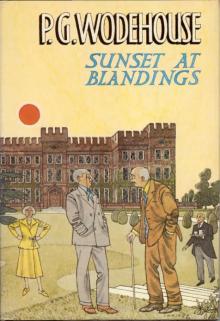 Sunset at Blandings
Sunset at Blandings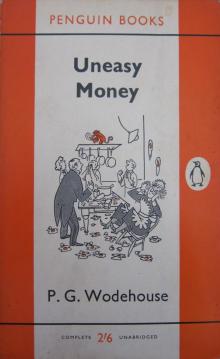 Uneasy Money
Uneasy Money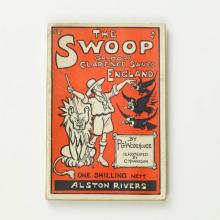 The Swoop! or, How Clarence Saved England: A Tale of the Great Invasion
The Swoop! or, How Clarence Saved England: A Tale of the Great Invasion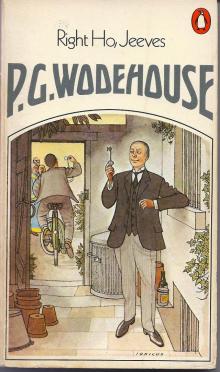 Right Ho, Jeeves
Right Ho, Jeeves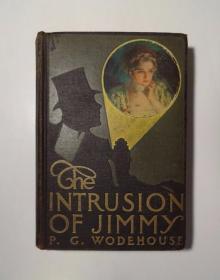 The Intrusion of Jimmy
The Intrusion of Jimmy The Jeeves Omnibus - Vol 1:
The Jeeves Omnibus - Vol 1: Aunts Aren't Gentlemen:
Aunts Aren't Gentlemen: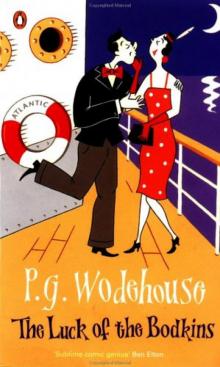 The Luck of the Bodkins
The Luck of the Bodkins The Little Nugget
The Little Nugget Money for Nothing
Money for Nothing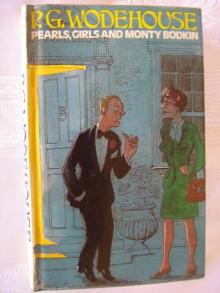 Pearls, Girls and Monty Bodkin
Pearls, Girls and Monty Bodkin Mulliner Nights
Mulliner Nights Blandings Castle and Elsewhere
Blandings Castle and Elsewhere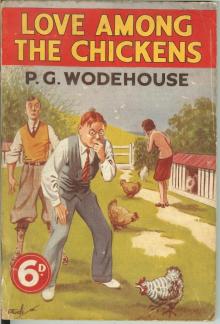 Love Among the Chickens
Love Among the Chickens Carry On, Jeeves!
Carry On, Jeeves!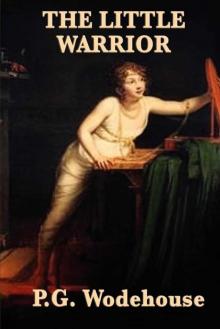 The Little Warrior
The Little Warrior Ice in the Bedroom
Ice in the Bedroom Leave It to Psmith
Leave It to Psmith Thank You, Jeeves:
Thank You, Jeeves: Money in the Bank
Money in the Bank The Man Upstairs and Other Stories
The Man Upstairs and Other Stories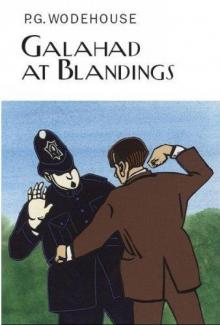 Galahad at Blandings
Galahad at Blandings The Jeeves Omnibus Vol. 5
The Jeeves Omnibus Vol. 5 Uncle Dynamite
Uncle Dynamite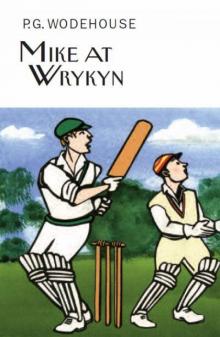 Mike at Wrykyn
Mike at Wrykyn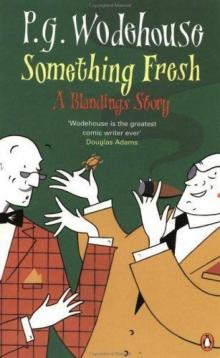 Something Fresh
Something Fresh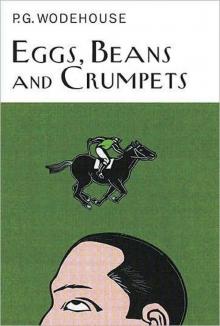 Eggs, Beans and Crumpets
Eggs, Beans and Crumpets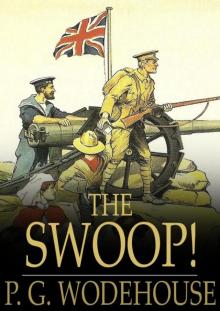 The Swoop: How Clarence Saved England (Forgotten Books)
The Swoop: How Clarence Saved England (Forgotten Books)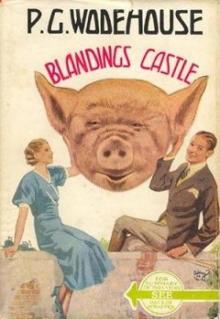 Blanding Castle Omnibus
Blanding Castle Omnibus Wodehouse at the Wicket: A Cricketing Anthology
Wodehouse at the Wicket: A Cricketing Anthology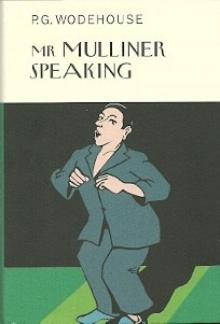 Mr. Mulliner Speaking
Mr. Mulliner Speaking Hot Water
Hot Water The Jeeves Omnibus - Vol 3: The Mating Season / Ring for Jeeves / Very Good, Jeeves
The Jeeves Omnibus - Vol 3: The Mating Season / Ring for Jeeves / Very Good, Jeeves The Mating Season
The Mating Season Meet Mr. Mulliner
Meet Mr. Mulliner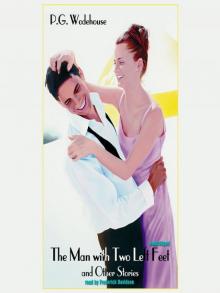 The Man with Two Left Feet, and Other Stories
The Man with Two Left Feet, and Other Stories Not George Washington — an Autobiographical Novel
Not George Washington — an Autobiographical Novel Young Men in Spats
Young Men in Spats The Jeeves Omnibus Vol. 4
The Jeeves Omnibus Vol. 4 A Pelican at Blandings:
A Pelican at Blandings: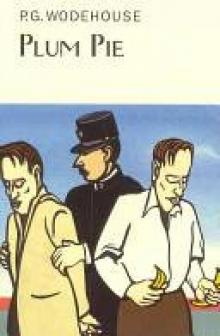 Plum Pie
Plum Pie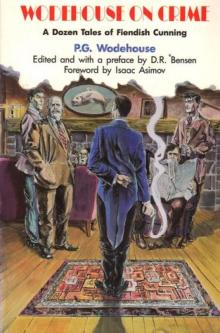 Wodehouse On Crime
Wodehouse On Crime The Jeeves Omnibus Vol. 2: Right Ho, Jeeves / Joy in the Morning / Carry On, Jeeves
The Jeeves Omnibus Vol. 2: Right Ho, Jeeves / Joy in the Morning / Carry On, Jeeves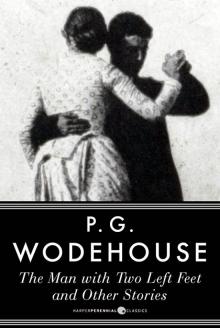 The Man With Two Left Feet
The Man With Two Left Feet Full Moon:
Full Moon: Jeeves and the Feudal Spirit:
Jeeves and the Feudal Spirit: Ring For Jeeves
Ring For Jeeves Something New
Something New The Girl on the Boat
The Girl on the Boat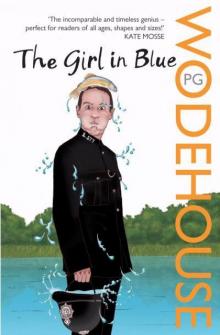 The Girl in Blue
The Girl in Blue Pigs Have Wings:
Pigs Have Wings: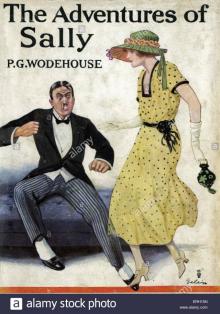 The Adventures of Sally
The Adventures of Sally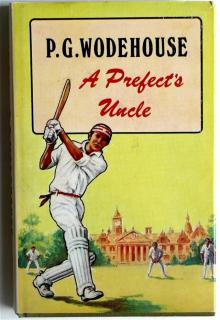 A Prefect's Uncle
A Prefect's Uncle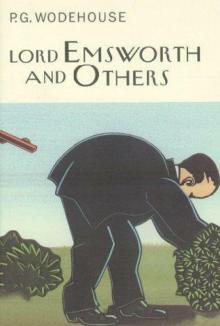 Lord Emsworth and Others
Lord Emsworth and Others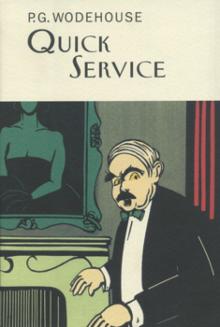 Quick Service
Quick Service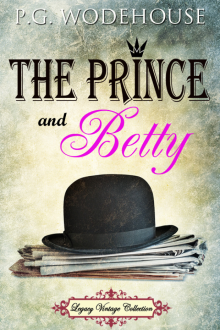 The Prince and Betty
The Prince and Betty The Gem Collector
The Gem Collector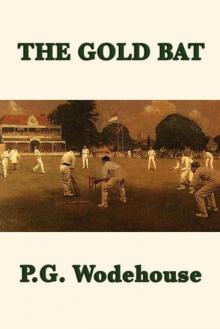 The Gold Bat
The Gold Bat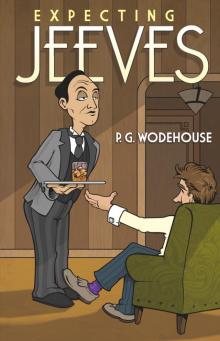 Expecting Jeeves
Expecting Jeeves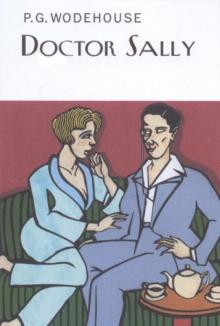 Doctor Sally
Doctor Sally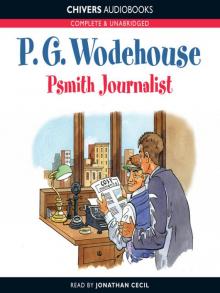 Psmith, Journalist
Psmith, Journalist The Golf Omnibus
The Golf Omnibus Heavy Weather
Heavy Weather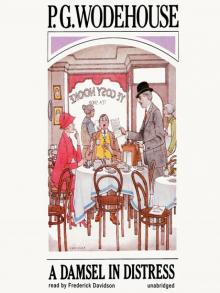 A Damsel in Distress
A Damsel in Distress The Coming of Bill
The Coming of Bill Summer Lightning
Summer Lightning Piccadilly Jim
Piccadilly Jim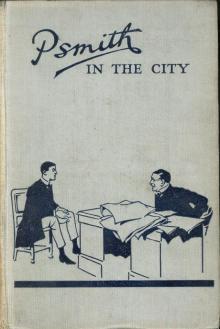 Psmith in the City
Psmith in the City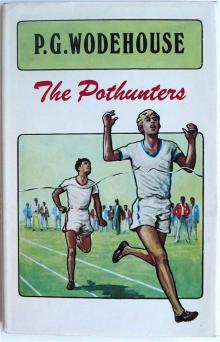 The Pothunters
The Pothunters Service With a Smile
Service With a Smile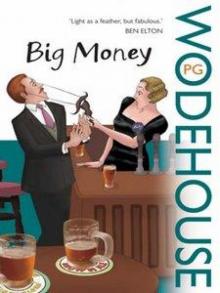 Big Money
Big Money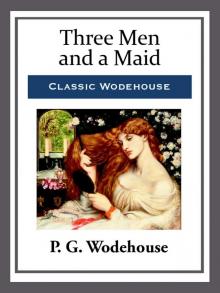 Three Men and a Maid
Three Men and a Maid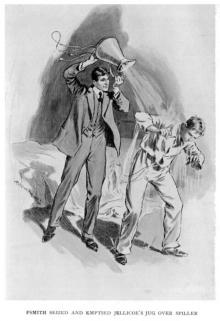 Mike and Psmith
Mike and Psmith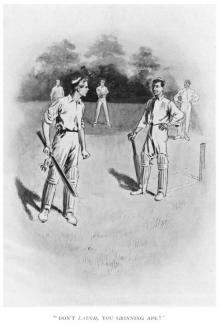 Mike
Mike Tales of St. Austin's
Tales of St. Austin's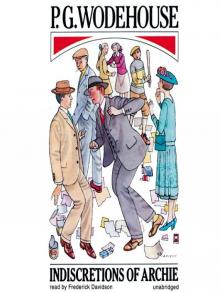 Indiscretions of Archie
Indiscretions of Archie Pigs Have Wings
Pigs Have Wings The Jeeves Omnibus - Vol 4: (Jeeves & Wooster): No.4
The Jeeves Omnibus - Vol 4: (Jeeves & Wooster): No.4 The White Feather
The White Feather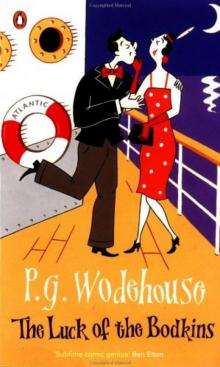 Luck of the Bodkins
Luck of the Bodkins THE SPRING SUIT
THE SPRING SUIT Full Moon
Full Moon Very Good, Jeeves
Very Good, Jeeves Thank You, Jeeves
Thank You, Jeeves Reginald's Record Knock.
Reginald's Record Knock. Wodehouse At the Wicket
Wodehouse At the Wicket LADIES AND GENTLEMEN V. PLAYERS
LADIES AND GENTLEMEN V. PLAYERS The Jeeves Omnibus - Vol 5: (Jeeves & Wooster)
The Jeeves Omnibus - Vol 5: (Jeeves & Wooster) The Jeeves Omnibus - Vol 1: (Jeeves & Wooster): No.1
The Jeeves Omnibus - Vol 1: (Jeeves & Wooster): No.1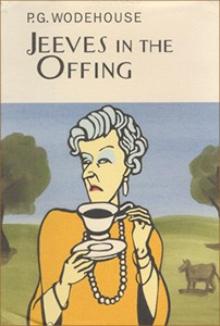 Jeeves in the offing jaw-12
Jeeves in the offing jaw-12